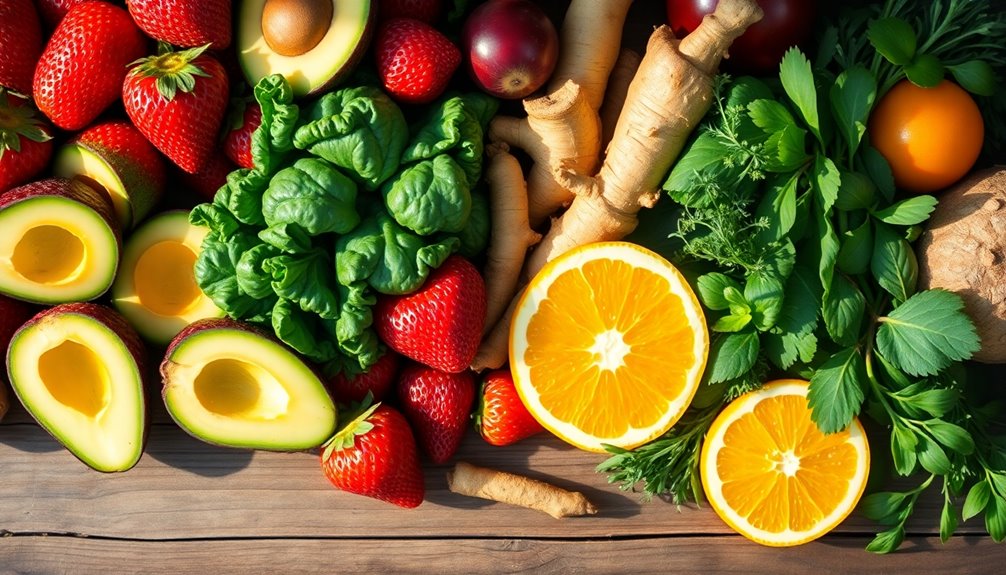A raw food diet centers on unprocessed, raw foods such as ripe fruits, veggies, nuts, and seeds. It aims to enhance your health by providing abundant nutrients, enzymes, and antioxidants. Many individuals notice enhanced energy and digestion, as well as clearer skin. However, it's crucial to strategize your meals thoughtfully to prevent potential nutrient deficiencies, especially concerning vitamins like B12. While some cooking can improve nutrient absorption, a well-rounded raw food diet can still nurture your overall health. If you're interested in the optimal ways to shift and prepare raw dishes, there's plenty more to discover.
Key Takeaways
- A raw food diet emphasizes unprocessed, uncooked foods to boost health, energy, and digestion while supporting sustainable agriculture.
- It offers numerous health benefits, including improved immune function, clearer skin, and better nutrient absorption from enzymes preserved in raw foods.
- Transitioning to a raw food diet can be gradual, involving increased raw fruits and vegetables, meal planning, and essential kitchen tools.
- Nutritional deficiencies can occur without careful planning, so a balanced diet with healthy fats and proteins is crucial for success.
- Support from a community fosters motivation and shared experiences, making it easier to navigate challenges associated with a raw food lifestyle.
What Is a Raw Food Diet?
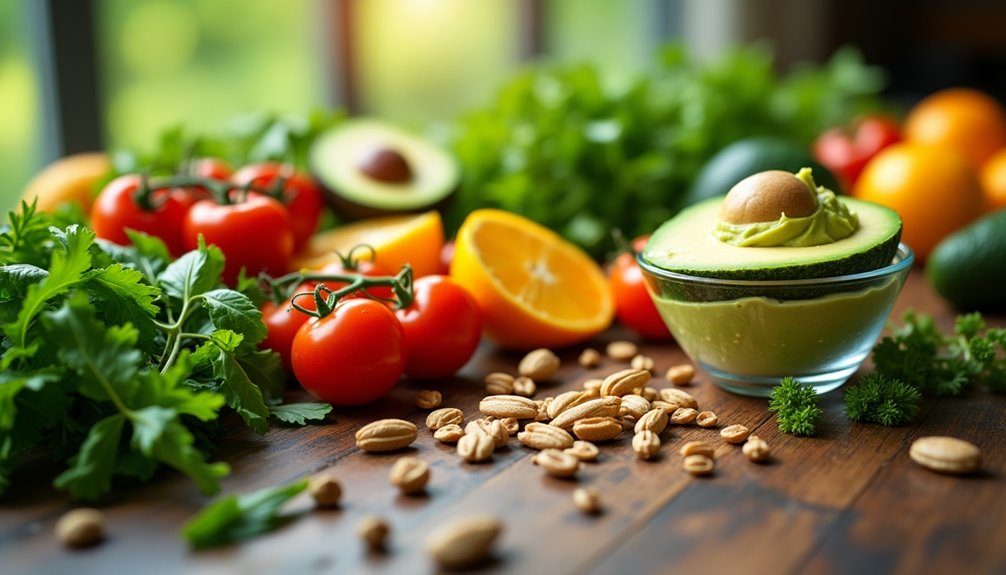
A raw food diet emphasizes the consumption of unprocessed, uncooked foods, primarily fruits, vegetables, nuts, and seeds. This approach aligns with the raw food philosophy, which advocates for natural eating as a way to promote health and vitality. By choosing raw foods, you're not only focusing on your personal well-being but also making choices that can positively impact the environment.
Eating raw can significantly reduce your carbon footprint. When you opt for whole, plant-based ingredients, you're supporting sustainable agricultural practices. These foods typically require less energy to produce and transport compared to processed alternatives.
Furthermore, since raw diets often emphasize local produce, you're likely to support local farmers and reduce the environmental impact associated with long-distance food transport.
However, it's vital to recognize that the raw food philosophy isn't just about what you eat; it's also about the mindset you cultivate. You'll find a community of like-minded individuals who share your commitment to sustainability and health. This sense of belonging can enhance your journey, making it easier to stay motivated and inspired.
While the raw food diet offers a fresh perspective on eating, balancing it with practicality is crucial. Consider your lifestyle, nutritional needs, and how this diet fits into your everyday life. By embracing the raw food philosophy, you're taking a step towards not only nourishing yourself but also contributing to a healthier planet. Additionally, many people who adopt a raw food diet report experiencing improved health and vitality, which aligns with the benefits of a plant-based diet.
Health Benefits of Raw Foods
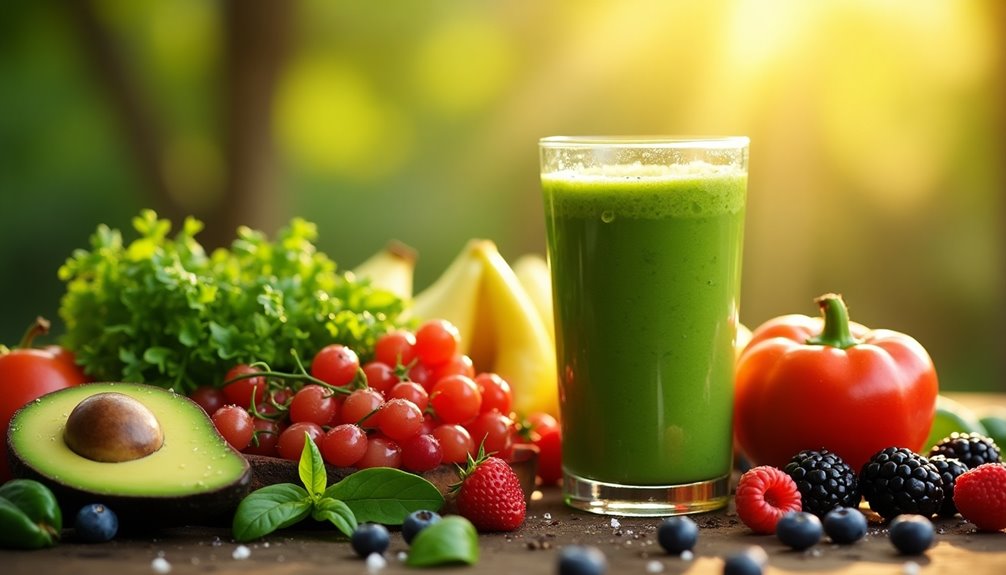
Raw foods offer numerous health benefits that can enhance your overall well-being. By incorporating raw fruits, vegetables, nuts, and seeds into your diet, you'll likely experience improved energy levels and a stronger immune system. One of the key raw food benefits is that these foods are packed with raw food nutrients, which are often diminished during cooking. Vitamins, minerals, and enzymes found in raw foods can play a crucial role in your body's ability to function efficiently.
You might notice better digestion due to the high fiber content in raw foods, which helps regulate your digestive system. Many people also report clearer skin and healthier hair when they switch to a raw food diet, thanks to the antioxidants and phytonutrients present in these unprocessed ingredients. These compounds can help combat oxidative stress and inflammation, leading to a more youthful appearance.
Moreover, embracing a raw food lifestyle can foster a sense of community. Many raw food enthusiasts share recipes and tips, creating a supportive environment where you can connect with others who share similar health goals. This sense of belonging can be incredibly motivating as you navigate your journey toward healthier eating.
In addition, adopting raw foods can encourage mindfulness about what you consume. Preparing fresh ingredients allows you to appreciate the flavors and textures of whole foods, fostering a deeper relationship with your meals. Ultimately, the health benefits of raw foods can lead you to a more dynamic, engaged life. Additionally, incorporating whole food sources of protein into your raw diet can enhance your overall nutritional intake and support muscle synthesis.
Nutritional Considerations
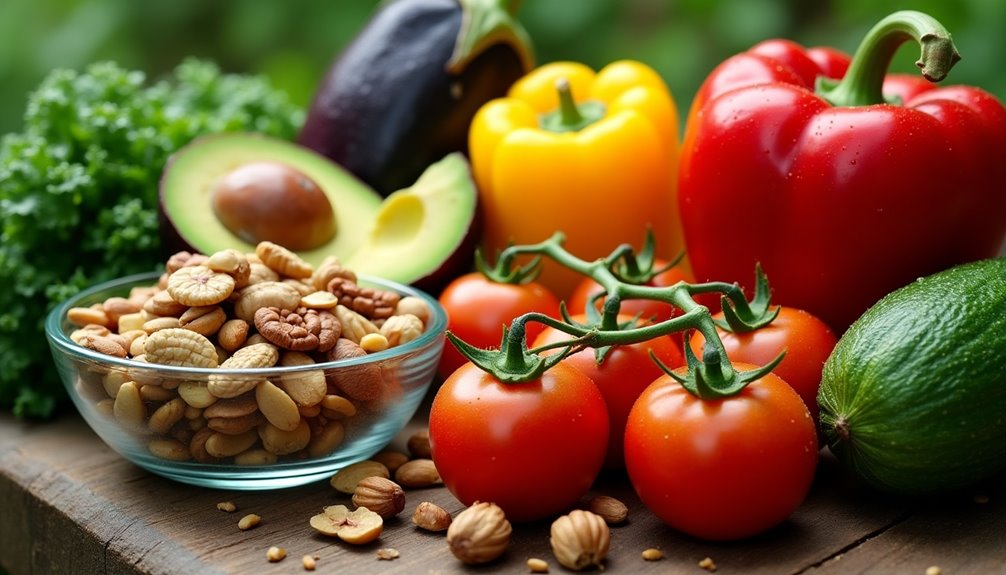
When pondering a raw food diet, it's essential to pay attention to nutritional balance to make certain you're meeting your body's needs. While raw foods can be abundant in vitamins, minerals, and enzymes, it's important to comprehend how these nutrients operate within your body. A key advantage of a raw food diet is the preservation of enzymes, which can assist in digestion and enhance nutrient absorption. These enzymes are often destroyed during cooking, so opting for raw foods can help maximize their benefits.
However, you need to be mindful of potential nutrient deficiencies. For example, certain vitamins, like B12, are mainly found in animal products. If you're following a strict raw vegan diet, you might need to contemplate fortified foods or supplements to make sure you're getting enough of this essential vitamin.
Additionally, while fruits and vegetables provide ample vitamin C and antioxidants, they may lack sufficient amounts of healthy fats and proteins, which are vital for overall health. To achieve a balanced raw food diet, aim to include a variety of food groups. Incorporate nuts, seeds, and avocados for healthy fats, and mull over sprouted legumes for protein. By being deliberate about your food choices, you can enhance vitamin absorption, support your overall well-being, and relish the rich flavors that raw foods offer.
Remember, embracing a raw food lifestyle doesn't mean compromising your nutritional health; it's about finding the right balance that works for you. Additionally, exploring custom keto diet plans can provide you with tailored meal options that align with your nutritional goals.
Common Myths Debunked
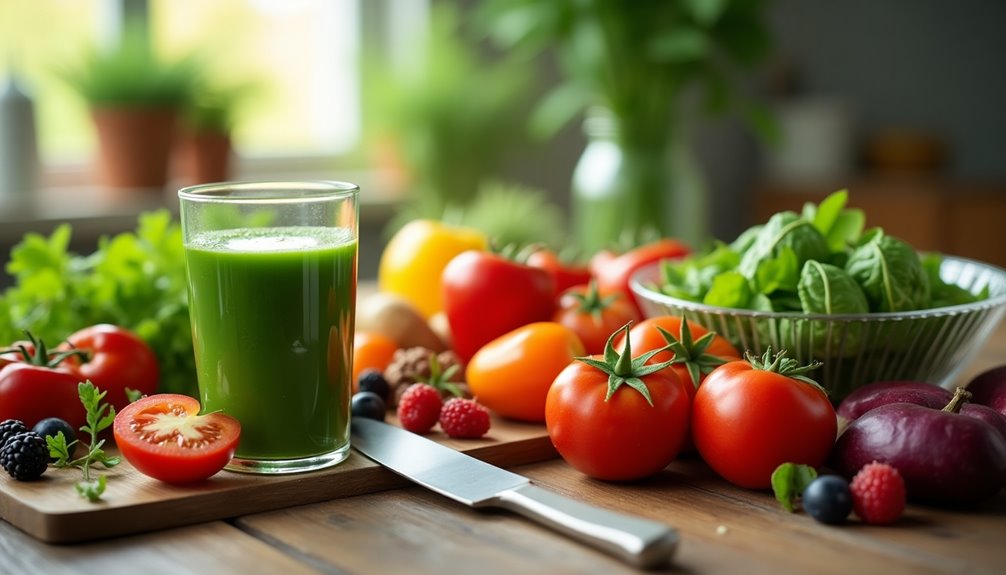
Many people believe that a raw food diet guarantees better health and weight loss, but this isn't always the case. There are several common misconceptions about raw food diets that may mislead you. Understanding these can help you make more informed choices about your nutrition.
- Raw foods are always healthier: While many raw fruits and vegetables are nutrient-rich, some foods can be more beneficial when cooked. For example, cooking tomatoes increases the availability of lycopene, a powerful antioxidant.
- You'll lose weight effortlessly: While a raw food diet may lead to weight loss initially, it's not a magic solution for everyone. Individual results vary, and maintaining a balanced diet is essential for long-term success. Some people may experience fatigue or nutrient deficiencies without proper planning.
- All nutrients are preserved in raw foods: This is a common myth. Certain nutrients, like vitamin B12 and omega-3 fatty acids, are primarily found in animal products, which are often excluded from a strict raw food diet. Scientific evidence suggests that a well-rounded diet is essential for best health. Additionally, some raw diets can lead to blood sugar spikes similar to those caused by high-carb bread, which may trigger cravings and hinder weight loss.
Challenges of a Raw Food Lifestyle
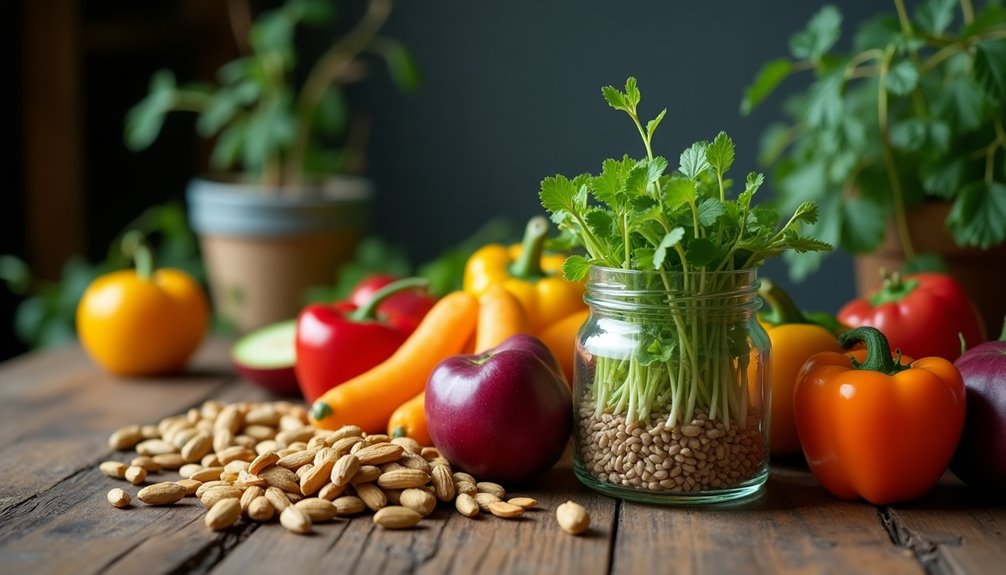
Embracing a raw food lifestyle can come with its unique set of challenges that may not be immediately apparent. One of the most significant obstacles you might face involves social gatherings. Whether it's a friend's birthday party or a family dinner, you'll often encounter temptations that can make sticking to your raw food choices challenging. The sight of cooked dishes and desserts can be hard to resist, especially if you're surrounded by others who aren't following a similar diet.
Another challenge is the time and preparation required to maintain a raw food diet. Preparing fresh, nutrient-dense meals from scratch can be time-consuming, particularly if you're not accustomed to planning ahead. You'll need to dedicate time to shopping for quality ingredients, washing, chopping, and marinating. This commitment can sometimes feel overwhelming, especially on busy days.
Moreover, finding a balance between convenience and health can be tricky. Many pre-packaged raw food options can be expensive or lack the same nutritional value as whole foods. Interestingly, adopting a plant-based diet can lead to improved health and emotional well-being, which may help mitigate some of these challenges. As you navigate these challenges, it's crucial to find a community or support network to share experiences and tips. Remember, you're not alone in this journey, and connecting with others can make it easier to overcome the hurdles of a raw food lifestyle. By understanding these challenges, you can better prepare yourself and ultimately thrive in your commitment to a healthier way of eating.
Tips for Transitioning

Shifting to a raw food diet can feel daunting, but breaking it down into manageable steps can make the process smoother. To help you navigate effectively, consider these tips that focus on meal planning and essential kitchen equipment.
- Start Gradually: Instead of overhauling your entire diet overnight, begin by incorporating more raw fruits and vegetables into your meals. Aim for a few raw meals each week, and gradually increase that number as you feel comfortable.
- Invest in Kitchen Equipment: Having the right tools can make a world of difference. Essential kitchen gear for a raw food diet includes a high-quality blender, a food processor, and a spiralizer. These tools will help you create delicious salads, smoothies, and pasta alternatives, making your meals more enjoyable.
- Plan Your Meals: Meal planning is vital for staying on track. Set aside time each week to plan your raw meals, ensuring you have a variety of options to avoid monotony. Consider batch-prepping snacks, like raw energy balls or veggie sticks, so you always have something ready when hunger strikes. Additionally, understanding the importance of natural calorie cycles can help you maintain a balanced and healthy approach to your raw food diet.
Raw Food Recipes to Try
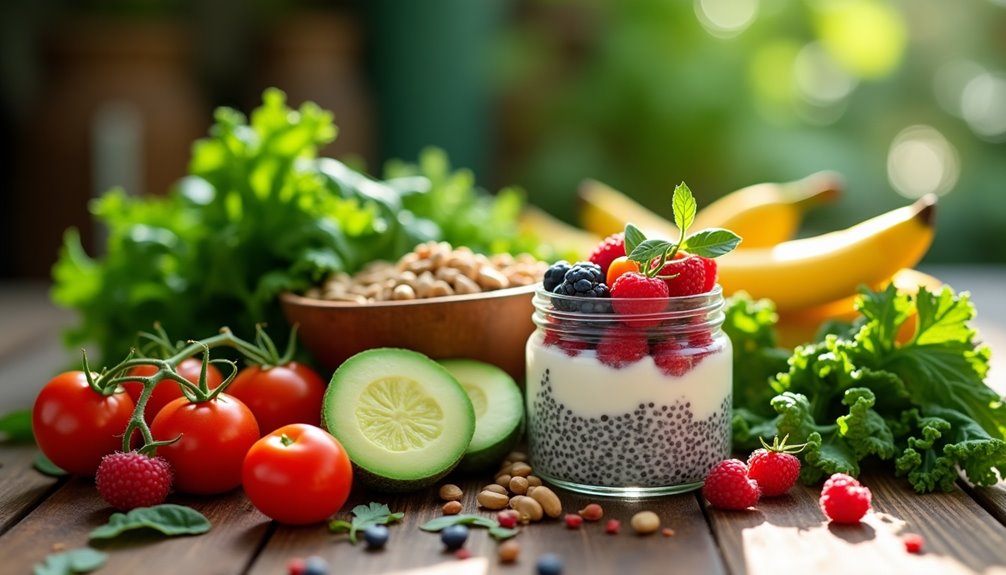
Exploring new raw food recipes can open up a world of flavors and textures while keeping your meals nutritious. One great option to start with is smoothie bowls. These vibrant bowls aren't just visually appealing; they're packed with essential vitamins and minerals. Blend your favorite fruits, like bananas and berries, with spinach or kale for an invigorating base. Top it off with nuts, seeds, and granola for an added crunch. This customizable dish allows you to experiment with different combinations, ensuring you never get bored. Additionally, incorporating fat-melting smoothie recipes from The Smoothie Diet can enhance the nutritional value of your bowls.
Another fantastic raw food recipe to try is zucchini noodles, or "zoodles." Spiralizing zucchini into noodle shapes offers a fun and low-carb alternative to traditional pasta. Toss your zoodles with a homemade raw pesto made of fresh basil, garlic, and pine nuts for a delightful meal. You can also add cherry tomatoes, olives, and bell peppers for a burst of color and flavor.
Both smoothie bowls and zucchini noodles exemplify how raw food can be both satisfying and nourishing. They allow you to connect with the ingredients, highlighting their natural textures and tastes. Plus, preparing these dishes can be a fun activity to share with family or friends, fostering a sense of community around healthy eating. Embrace the journey of discovering new raw food recipes and enjoy the vibrant flavors they bring to your table.
Expert Opinions on Raw Diets
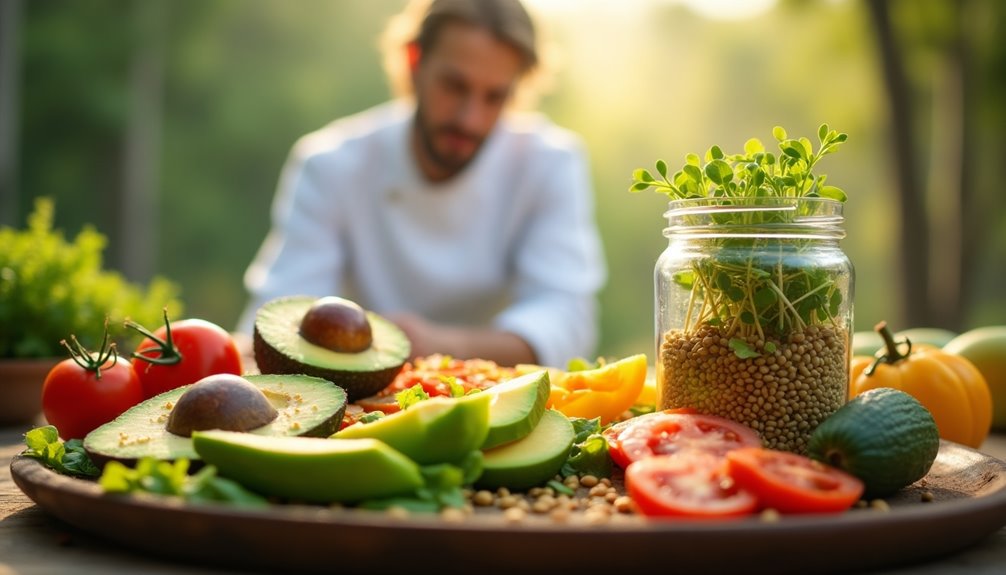
When considering a raw food diet, weighing expert opinions is vital to understand its benefits and potential drawbacks. Nutritionists and dietitians often share insights that can help you make informed choices. Here are three key points they emphasize:
- Nutritional Balance: Many experts warn that a raw food diet can lead to nutritional deficiencies if not carefully planned. While raw fruits and vegetables are high in vitamins, you might miss out on essential nutrients like protein, calcium, and vitamin B12, typically found in cooked foods or animal products.
- Digestive Enzymes: Proponents of raw diets often highlight the importance of digestive enzymes found in uncooked foods, which can aid digestion and improve gut health. However, some nutritionists argue that cooking can enhance nutrient absorption and eliminate harmful bacteria, suggesting that moderation is key.
- Individual Needs: Every person's body responds differently to dietary changes. What works for one may not work for another. It's crucial to listen to your body and consult with a healthcare professional to tailor a diet that meets your nutritional needs. Additionally, incorporating regular exercise and focusing on muscle strengthening glutes can further support overall health while following a raw food diet.
Frequently Asked Questions
Can Children Safely Follow a Raw Food Diet?
When considering if children can safely follow a specific diet, you've got to think about their nutritional needs. Kids require a balanced intake of vitamins, minerals, and proteins for growth. A diet lacking in essential nutrients might lead to long-term effects on their health.
It's essential to consult with a healthcare professional to confirm their dietary choices support their development while still being safe and enjoyable for them.
What Kitchen Tools Are Essential for a Raw Food Diet?
In the kitchen, the right tools are your magic wand, turning simple ingredients into culinary masterpieces. For your cooking adventures, a high-powered blender is essential for whipping up delightful smoothies and blender recipes that burst with flavor.
A dehydrator offers incredible benefits, allowing you to create crunchy snacks and preserve nutrients. These tools will help you craft delicious and nutritious meals, making your kitchen feel like a welcoming haven for creativity and connection.
How Can I Eat Raw Food While Traveling?
When you're traveling, finding raw food snacks can be a challenge, but it's doable! Pack portable options like nuts, dried fruits, and cut veggies.
While eating out, look for restaurants that offer fresh salads or veggie platters. Don't hesitate to ask for modifications to fit your needs.
Connecting with local food communities can also help you discover nearby markets or cafes that cater to your preferences, making the journey enjoyable and fulfilling.
Are There Any Raw Food Diet Communities or Support Groups?
Imagine stepping into a vibrant community where everyone shares your passion for healthy living. You're not alone in your journey!
You can find several online forums and local meet-ups that focus on finding recipes and achieving nutritional balance. These groups provide support, encouragement, and a wealth of information. Joining them can foster a sense of belonging while helping you navigate your dietary choices.
You'll connect with others who understand your goals and challenges.
What Should I Do if I Experience Digestive Issues on a Raw Diet?
If you're experiencing digestive issues, it's important to listen to your body. You might consider adding digestive enzymes to help break down food more effectively.
Probiotic supplements can also support gut health by balancing your microbiome.
Hydration is key, so drink plenty of water.
If problems persist, consult a healthcare professional to rule out any underlying issues.
Conclusion
In embracing a raw food diet, you're not just changing what you eat; you're transforming your relationship with food itself. While the benefits can be enticing, it's essential to weigh the nutritional considerations and potential challenges. Remember, every diet isn't one-size-fits-all, and what works for one person might not work for another. So, will you take the plunge into vibrant, unprocessed meals, or will you let the opportunity pass? Your health journey is in your hands.

